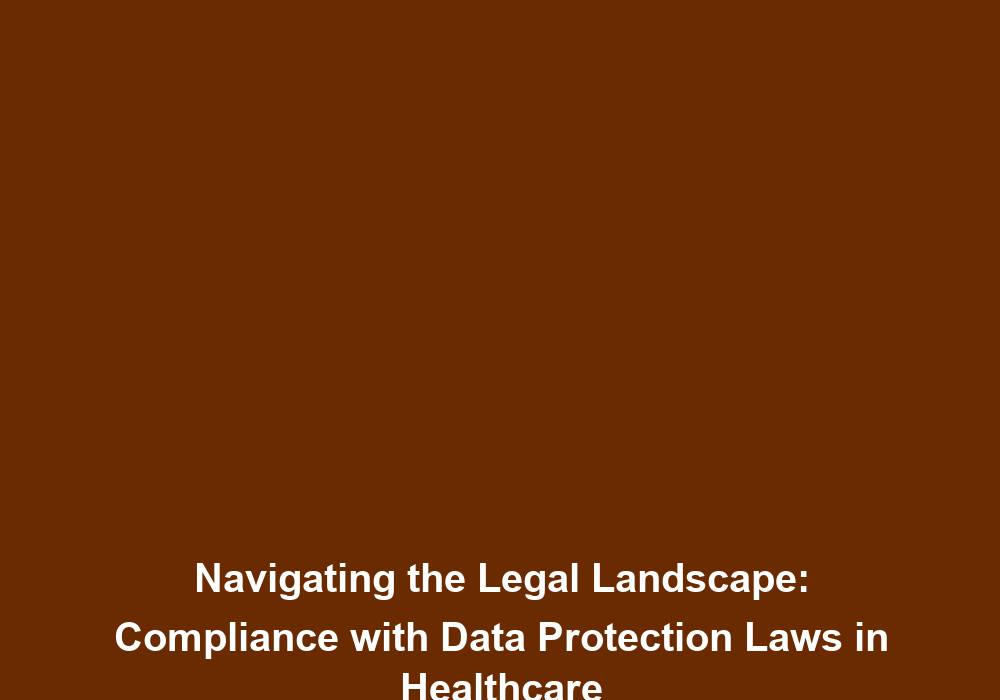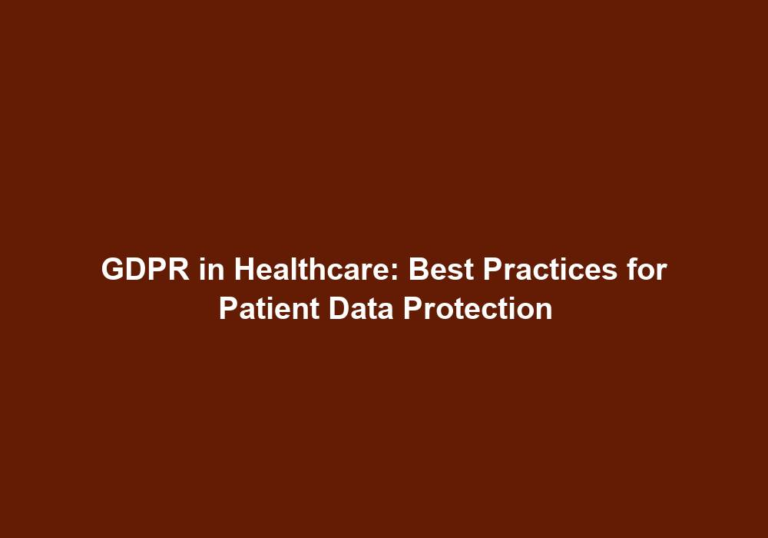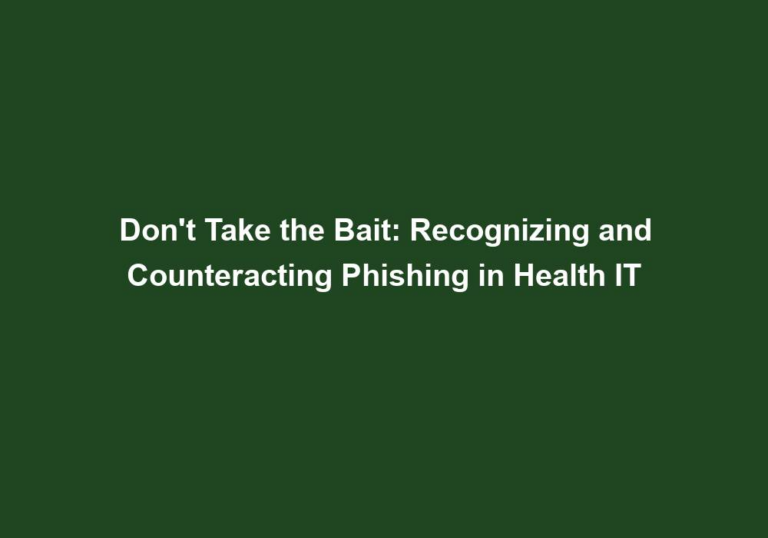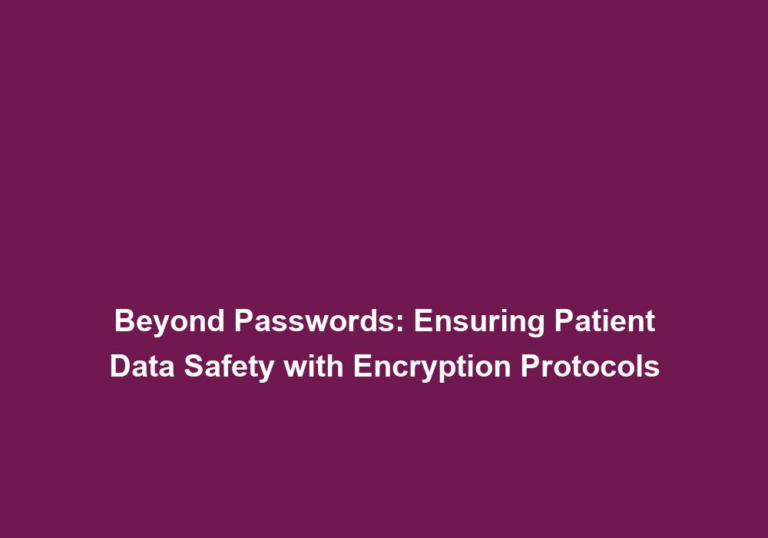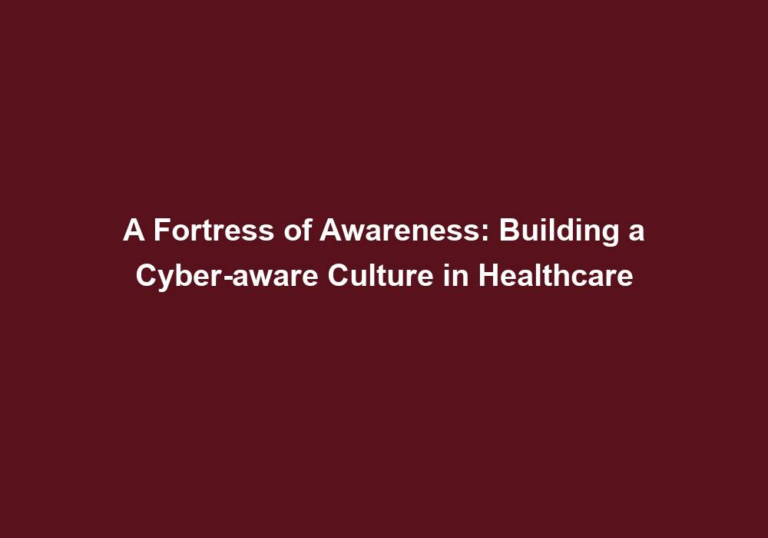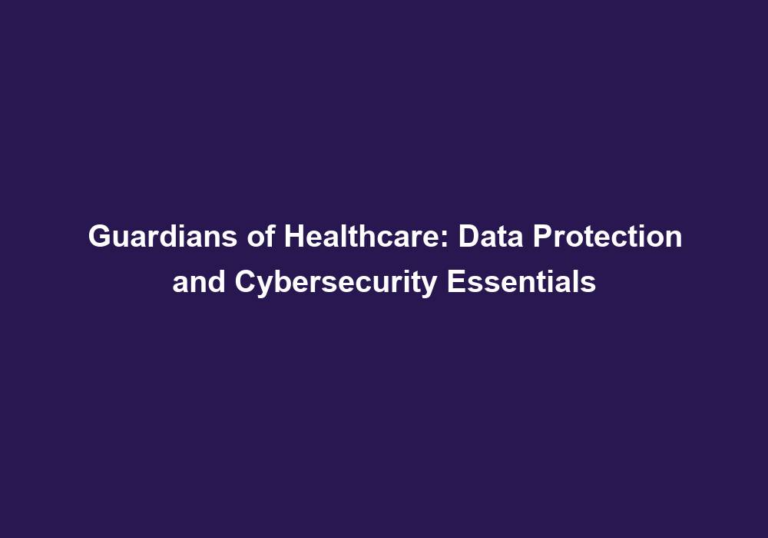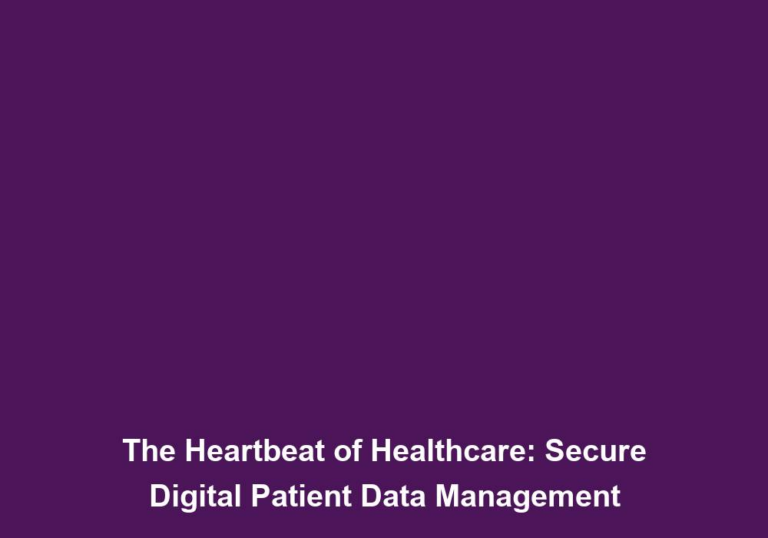Navigating the Legal Landscape: Compliance with Data Protection Laws in Healthcare
In today’s digital age, data privacy and protection have become crucial topics across various industries, including healthcare. The healthcare sector handles vast amounts of sensitive patient information, making it essential for healthcare providers and organizations to effectively navigate the legal landscape and comply with data protection laws.
The Importance of Data Protection in Healthcare
Data protection is a fundamental aspect of ensuring patient privacy and maintaining trust in the healthcare system. As technology advancements continue to revolutionize the way healthcare organizations handle and store data, the risk of data breaches and unauthorized access becomes a significant concern.
By implementing robust data protection measures, healthcare providers can safeguard patient information from unauthorized access, maintain compliance with relevant regulations, and mitigate potential legal and financial consequences resulting from data breaches.
Data protection is crucial in healthcare for several reasons:
-
Patient Privacy: Data protection measures ensure that patient information remains private and confidential. This is particularly important in healthcare, where sensitive information such as medical records and personal details are involved. Protecting patient privacy builds trust between healthcare providers and patients.
-
Legal Compliance: Compliance with data protection laws is not only ethically important but also legally required. Healthcare organizations must comply with regulations such as the Health Insurance Portability and Accountability Act (HIPAA), the General Data Protection Regulation (GDPR), and the California Consumer Privacy Act (CCPA) to avoid legal complications and penalties.
-
Mitigating Data Breach Risks: Robust data protection measures help healthcare organizations mitigate the risks of data breaches. Data breaches can result in significant financial losses, damage to reputation, and legal consequences. By implementing strong security measures, healthcare providers can minimize the likelihood of data breaches and protect patient information.
Understanding Data Protection Laws in Healthcare
To navigate the legal landscape successfully, healthcare organizations need to familiarize themselves with the key data protection laws and regulations applicable to their operations. Below are some of the most notable laws that healthcare providers must consider:
1. Health Insurance Portability and Accountability Act (HIPAA)
HIPAA is a federal law in the United States that sets the standard for protecting sensitive patient data. It requires healthcare providers, health plans, and healthcare clearinghouses to implement safeguards to protect patients’ medical records and other identifiable health information.
Under HIPAA, healthcare organizations are required to adopt administrative, technical, and physical safeguards to ensure the confidentiality, integrity, and availability of patients’ protected health information (PHI). Additionally, they must provide patients with notice of their privacy practices and obtain their consent before using or disclosing their PHI.
HIPAA safeguards include:
- Administrative Safeguards: These involve policies and procedures for managing the security of patient information, training employees on data protection, and assigning a privacy officer responsible for overseeing compliance.
- Technical Safeguards: These include measures such as encryption, access controls, and audit controls to protect electronic patient information.
- Physical Safeguards: These focus on securing the physical storage and disposal of patient records, ensuring limited access to authorized personnel only.
2. General Data Protection Regulation (GDPR)
The GDPR is a comprehensive data protection regulation enacted by the European Union (EU). Although it primarily focuses on the protection of personal data within the EU, it also applies to organizations outside the EU that process the data of EU residents.
For healthcare organizations that provide services to individuals residing in the EU or process data originating from the EU, compliance with GDPR is vital. The regulation imposes strict requirements on acquiring consent, data breach notifications, and the transfer of personal data, among other provisions.
Key aspects of GDPR compliance for healthcare organizations include:
- Lawful Basis for Processing: Healthcare organizations must have a lawful basis for processing personal data, such as obtaining explicit consent from patients or fulfilling a legal obligation.
- Data Breach Notifications: In the event of a data breach, healthcare organizations must notify the relevant supervisory authority within 72 hours and affected individuals without undue delay.
- Data Transfers: If personal data is transferred outside the EU, healthcare organizations must ensure that appropriate safeguards are in place, such as using Standard Contractual Clauses or relying on adequacy decisions.
3. California Consumer Privacy Act (CCPA)
The CCPA is a state-level privacy law in California, United States, designed to enhance privacy rights and consumer protection. It grants California residents certain rights over their personal information and imposes obligations on businesses that collect and process their data.
Healthcare organizations operating in California or handling the personal information of California residents must comply with the CCPA. This includes providing clear and accessible privacy notices, enabling consumers to opt-out of data sharing, and implementing reasonable security measures to protect personal information.
Key requirements of CCPA compliance for healthcare organizations include:
- Consumer Rights: Healthcare organizations must inform consumers about their rights, such as the right to access their personal information, the right to delete it, and the right to opt-out of the sale of their information.
- Data Security: Healthcare organizations must implement and maintain reasonable security measures to protect personal information from unauthorized access, use, and disclosure.
- Privacy Notices: Clear and comprehensive privacy notices must be provided, informing consumers about the categories of personal information collected, the purposes of collection, and the categories of third parties with whom the information is shared.
Best Practices for Ensuring Compliance
Complying with data protection laws in healthcare requires a proactive and comprehensive approach. Here are some best practices for ensuring compliance:
1. Conduct Regular Risk Assessments
Healthcare organizations should regularly conduct thorough risk assessments to identify potential vulnerabilities and gaps in their data protection practices. These assessments should evaluate the organization’s data storage, transmission, access controls, and third-party relationships to identify areas for improvement.
By regularly assessing risks, healthcare organizations can stay proactive in identifying and addressing potential security weaknesses, ensuring the ongoing protection of patient information.
2. Implement Strong Access Controls and Security Measures
To protect patient information, healthcare providers should implement strong access controls and security measures. This includes utilizing secure passwords, multi-factor authentication, encryption, and firewalls to prevent unauthorized access to sensitive data.
By implementing these security measures, healthcare organizations can ensure that only authorized personnel have access to patient information, minimizing the risk of data breaches and unauthorized disclosures.
3. Educate and Train Employees
Employees play a crucial role in maintaining data privacy and protection. Healthcare organizations should provide regular training and education programs to employees to raise awareness about data protection best practices. This includes educating them about phishing attempts, social engineering, and the proper handling of patient data.
By educating employees about potential risks and best practices, healthcare organizations create a culture of data protection and empower employees to make informed decisions when handling patient information.
4. Develop Incident Response Plans
Despite robust preventive measures, data breaches can still occur. Healthcare organizations should have well-defined incident response plans in place to promptly address and mitigate the impact of data breaches. These plans should outline the steps to be taken in the event of a breach, including notifying affected individuals and regulatory authorities, if necessary.
By having an incident response plan, healthcare organizations can minimize the damage caused by data breaches, demonstrate a commitment to addressing security incidents, and comply with legal requirements for reporting and notification.
5. Regularly Update Policies and Procedures
Data protection laws and regulations are subject to change, making it essential for healthcare organizations to stay up to date with the latest developments. Regularly reviewing and updating policies and procedures ensures compliance with any new legal requirements and industry best practices.
By staying current with data protection regulations, healthcare organizations can adapt their practices accordingly, ensuring ongoing compliance and the protection of patient information.
Conclusion
Complying with data protection laws in the healthcare sector is crucial for ensuring patient privacy, maintaining trust, and avoiding legal complications. By understanding the key laws and regulations, implementing robust data protection measures, and following best practices, healthcare organizations can navigate the legal landscape successfully and protect sensitive patient information from unauthorized access and data breaches.

